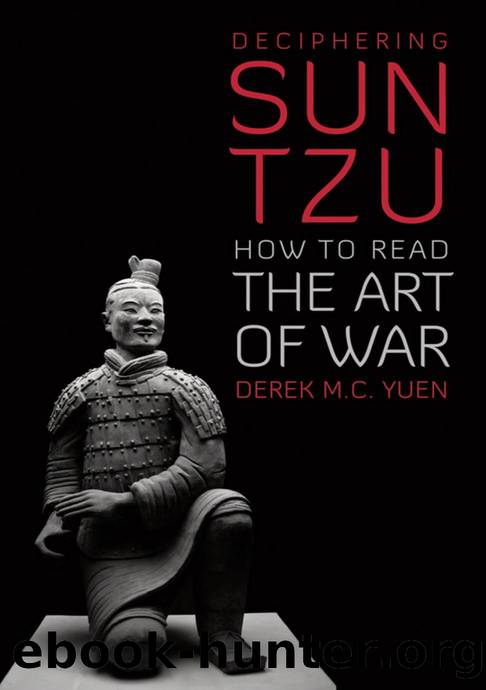Deciphering Sun Tzu : How to Read The Art of War by Derek M. C. Yuen

Author:Derek M. C. Yuen
Language: eng
Format: mobi, epub
Published: 2015-03-05T02:18:24+00:00
DECIPHERING SUN TZU
[T]he essence of defensive strategy is to show the enemy an inadequacy. The essence of aggressive strategy lies in showing the enemy that you have a surplus.
If you show the enemy an insufficiency, then they will certainly advance and attack. In this case âenemy does not know where to attack.â If you show the enemy a surplus, then they will certainly take up defensive positions. In this case âthe enemy does not know where to mount his defense.â29
Although it is often assumed that Sun Tzuâs original passage is nothing more than a truism, Tâang and Li read it from an entirely different angle in which the strategist utilizes âfrozenâ mindsets concerning attack and defense. It is important to note that âinadequacyâ and âsurplus,â as discussed in the above passage, have little to do with the real strength of a force. They are just postures for shaping the enemyâs perception, so that the enemy will stick with conventional norms that âone who cannot be
victorious assumes a defensive posture; one who can be victorious
attacks,â and will deviate from his original plan. In other words, this stratagem can be regarded as âattacking the enemyâs plansâ at the operational/tactical level. This is one of Sun Tzuâs methods for âcontrollingâ
the adversary and making his moves more predictable. At a higher level, the example manifests the workings of yinâyang, the dialectical engine of Chinese strategic thought, which suggests that any concept proposed
without considering its opposite is only half a concept.
âKnow thy Self, Know thy Enemyâ
âOne who knows the enemy and knows himself will not be endangered
in a hundred engagementsâ (Chapter 3) is one of Sun Tzuâs most well-known sayings: it was even used to provide a theoretical foundation for Information Warfare (IW), a key component of the Revolution in
Military Affairs (RMA). However, the apparent association between the maxim and the concept of information superiority or dominance is
indicative of the kind of serious misreading that Sun Tzuâs ideas have thus far experienced in the West. Though the maxim certainly has something to say about intelligence, it would be misguided to view it through the lens of Information Warfare without first understanding its true
meaning. If it were simply the case that the maxim notes the importance 110
DECIPHERING SUN TZU
of intelligence and the collection of information about an opponent,
then it would amount to nothing more than a self-evident truism.
Moreover, Sun Tzuâs thoughts on intelligence are elaborated at length in Chapter 13, entitled âEmploying Spies.â
Although Sun Tzu identifies various forms of intelligence, he places a particular emphasis on the role of cultural intelligence in war:
Of old the rise of the Yin (Shang) dynasty was because of Yi Yin who served the house Hsia; the rise of the Chou dynasty was because of Lu Ya [the Taâi Kung/
Tai Gong] who served in the house of Shang. Thus only those farsighted rulers and their superior commanders who can get the most intelligent people as their spies are destined to accomplish great things. (Chapter 13)30
Yi Yin was a leading official in
Download
Deciphering Sun Tzu : How to Read The Art of War by Derek M. C. Yuen.epub
This site does not store any files on its server. We only index and link to content provided by other sites. Please contact the content providers to delete copyright contents if any and email us, we'll remove relevant links or contents immediately.
The Radium Girls by Kate Moore(12028)
100 Deadly Skills by Clint Emerson(4924)
Rise and Kill First by Ronen Bergman(4788)
The Templars by Dan Jones(4689)
The Doomsday Machine by Daniel Ellsberg(4490)
The Rape of Nanking by Iris Chang(4211)
Killing England by Bill O'Reilly(4001)
Stalin by Stephen Kotkin(3965)
Hitler in Los Angeles by Steven J. Ross(3946)
12 Strong by Doug Stanton(3548)
Hitler's Monsters by Eric Kurlander(3341)
Blood and Sand by Alex Von Tunzelmann(3203)
The Code Book by Simon Singh(3189)
Darkest Hour by Anthony McCarten(3129)
The Art of War Visualized by Jessica Hagy(3007)
Hitler's Flying Saucers: A Guide to German Flying Discs of the Second World War by Stevens Henry(2754)
Babylon's Ark by Lawrence Anthony(2677)
The Second World Wars by Victor Davis Hanson(2524)
Tobruk by Peter Fitzsimons(2516)
